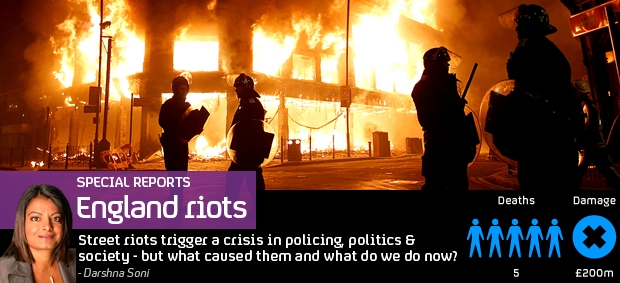Two thirds of rioters with previous conviction never jailed
Many of the people who have appeared in court in connection with last month’s riots have never been sent to jail before despite multiple previous convictions, new figures show.
- Chapters
- descriptions off, selected
- subtitles off, selected
- captions settings, opens captions settings dialog
- captions off, selected
This is a modal window.
This is a modal window. This modal can be closed by pressing the Escape key or activating the close button.
The news came as the Justice Secretary Ken Clarke told Channel 4 News that it could take an entire generation to solve many of the social problems the Government blames for the riots.
Data published by the Ministry of Justice shows that of the 1,715 rioters who have been hauled before a judge, 73 per cent had previously offended but despite this two thirds of them had avoided incarceration.
A quarter of the people charged over the violence and looting that swept through English cities had committed more than 10 previous offences, with one in 20 having more than 50, the figures show.
Mr Clarke said the statistics confirmed that “existing criminals were on the rampage” last month.
He told Channel 4 News that ridding the country of what he described as the “criminal instincts in so many people” could take a generation.
“You can’t change the culture overnight. It could take a very long time, it could take a generation, but this propensity to go back to this kind of behaviour has got to be steadily reduced,” he said.
It could take a very long time, it could take a generation, but this propensity to go back to this kind of behaviour has got to be steadily reduced – Ken Clarke
Referring to the justice system’s response to the riots, Mr Clarke said: “The courts proved they could give swift, firm justice and it sent quite a few of them to prison, and prison is the right punishment.
“But on top of prison, you need something intelligent done about the things that make them a bit tougher and come out and do it again. It reinforces my belief that reoffending is something that we’ve got to concentrate on in prison, give them some work to do, tackle their drug problems.”
- Chapters
- descriptions off, selected
- subtitles off, selected
- captions settings, opens captions settings dialog
- captions off, selected
This is a modal window.
This is a modal window. This modal can be closed by pressing the Escape key or activating the close button.
Mr Clarke supported the comments made by Work and Pensions Secretary Iain Duncan Smith who said the middle-classes had ignored the plight of people living on run-down council estates for years and then paid the price when the inner city “came to call” in last month’s violence and looting.
“We need the same sense of urgency and I think…on the underlying social problems of the council estates that Ian (Duncan Smith) describes, there’s no one answer, it needs a whole government effort on what actually works to protect the public in future,” said Mr Clarke.

The detailed figures also show that the previous convictions of alleged rioters included an average of nine for serious indictable offences and six for less serious summary or breach offences.
Of the total 16,598 previous offences committed by those accused of being involved in the riots, a quarter were for theft and handling of stolen goods, one in 10 were for drugs offences and more than one in 20 were for violence against the person.
The figures also showed more than half of juveniles had committed one or more previous offences.
Officials said, compared to the population as a whole, those involved in the riots were “much more likely to have had a conviction”.
Four in 10 of males aged 10-17 who were brought before the courts over the riots had at least one previous conviction, compared with just one in 50 of those aged 10-17 in the general population.
But the officials said that while those involved in the violence and looting were “much more likely than the population as a whole to have previous convictions, there is also evidence of some people being drawn into the criminal justice system for the first time.”
